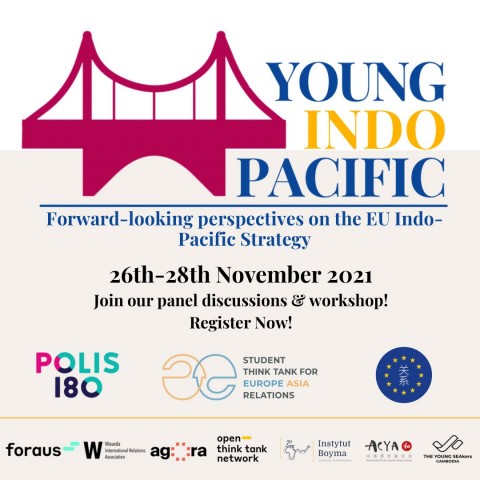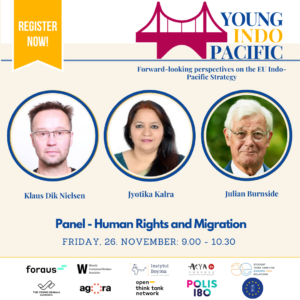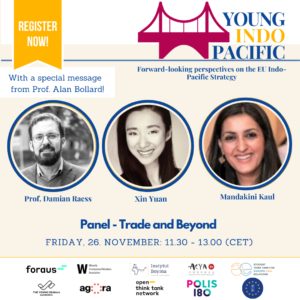
The Boym Institute, working with other think tanks, organizes panel discussions on topics related to the European Union’s Indo-Pacific strategy – Young Indo-Pacific: Forward-looking perspectives on the EU Indo-Pacific Strategy.
In this event, the three organizing think tanks – Polis180, European Guanxi and STEAR -, with support from Agora, Foraus, Boyma Institut, Australia China Youth Association, Waseda IR Association, The Young SEAkers and the Open ThinkTank Network, will host multiple panel discussions on topics regarding the European Union’s Indo-Pacific Strategy. If you want to know more about the EU Indo-Pacific Strategy make sure to read our introduction article.
The aim of the conference is to create a dialogue on the newly announced strategy of the European Union, to promote a broader understanding of the EU’s interactions with the Indo-Pacific region, and to look ahead at the direction in which key relationships between the EU and Indo-Pacific states and stakeholders will go. Moreover, we want to give students and young professionals from both regions a voice in international politics and foster a new platform for enhanced Asia-Europe cooperation.
Date and time of the panels:
Friday, 26. November:
9.00 -10.30 – Human Rights and Migration
- Jyotika Kalra (Member of the National Human Rights Commission of India)
- Julian Burnside (Australian Human Rights Lawyer and Activist)
- Klaus Dik Nielsen (Stakeholder Liaison, (Consultant), Office of the High Commissioner for Human Rights, Regional Office for South-East Asia (Migration and Human Rights)

10.30 – 11.30 – In conversation with Naoyuki Yoshino (Dean of the Asian Development Bank Institute, Professor emeritus of Keio University, Tokyo) – Financial collaboration between Europe and Indo-Pacific in regard to Green finance (30 minute presentation followed by Q&A)

11.30 – 13.00 – Trade and Beyond
- Xin Yuan (Representative to Europe at Shenzhen European Office)
- Prof. Damian Raess (SNSF Professor at the World Trade Institute)
- Mandakini Kaul (Senior Regional Cooperation Officer for South Asia at the World Bank in New Delhi)

20:00 – 20:45 – In conversation with Alan Bollard (Professor of Practice at the School of Government, Wellington School of Business and Government and chairman of the New Zealand Infrastructure Commission) (TBC)
Saturday, 27. November:
9.30 – 11.00 – Security and Geopolitics
- Prof. Harsh Pant (Professor of International Relations at King’s College London India Institute)
- Cristina de Esperanza Picardo (Joint PhD student at King’s College London and the National University of Singapore)
- Theresa Fallon (Founder and director of the Centre for Russia Europe Asia Studies and a member of the Council for Security Cooperation in the Asia-Pacific)

11.00 – 12.30 – Climate Change and Green Recovery
- Summer Chen (Climate Change Specialist at ERM, Former Head of Energy and Environment (East China) for the UK Foreign Commonwealth Office)
- Prof. Dhanasree Jayaram (Assistant Professor, Department of Geopolitics and International Relations, and Co-coordinator, Centre for Climate Studies, Manipal Academy of Higher Education (MAHE), Karnataka, India)
- Matthew MacGeoch (Transition Finance Analyst in the Market Intelligence Team at the Climate Bonds Initiative)

12.30 – 14.00 – Technology and Digitization
- Nigel Inkster (Senior Adviser for Cyber Security and China at the IISS and former assistant chief and director of operations and intelligence for the British Secret Intelligence Service)
- Prof. Stéphanie Balme (Dean of Sciences Po College, Professor at PSIA and Research Director at CERI)
- Sylwia Czubkowska (Journalist and a chief editor at the Polish service Spider’s Web)

14:00 – 15.00 – Networking Session
Sunday, 28. November:
11.00 – 14:00 – Workshop on drafting communique
The goal of the workshop is for participants to collect opinions and brainstorm ideas based on the issue areas discussed, culminating in a joint communique which will be issued by our organisations and presented to EU policymakers in December 2021/January 2022.
You can registrate for the event HERE.
czytaj więcej
Indonesia – between religion and democracy
Indonesia is the largest Muslim democracy in the world. Approximately 88% of the population in Indonesia declares Islamic religion, but in spite of this significant dominance, Indonesia is not a religious state.
Anna GrzywaczOnline Course: “Conflict Resolution and Democracy”
The course will be taught via interactive workshops, employing the Adam Institute’s signature “Betzavta – the Adam Institute’s Facilitation Method“, taught by its creator, Dr. Uki Maroshek-Klarman. The award-winning “Betzavta” method is rooted in an empirical approach to civic education, interpersonal communication and conflict resolution.
Join us for the Adam Institute’s Latest Online Course
Conflict resolution models have been primarily crafted and codified by men. The Adam Institute for Democracy and Peace invites you to be part of that much-needed change through an experiential and innovative Online Course "Conflict Resolution in the Context of Gender".
Liquidation of the Polish colony in Manchuria (north-eastern China)
Ms. Łucja Drabczak - A Polish woman born in Harbin, she spent her childhood in China. She returned to Poland at the age of 10. She is the author of the book 'China... Memories from my childhood'. She contacted us to convey special family memories related to leaving Manchuria in 1949.
Beyond Grey Hulls: Europe’s Role in “Crowdsourcing” Maritime Domain Awareness in the South China Sea
If developments observed in the South China Sea over the recent months are of any indication, it simply means that the situation has worsened. China’s continued aggression towards its neighbors – the Philippines and Vietnam in particular, has continued unabated.
Collin KohHow China uses its narratives on the Russo-Ukrainian war to court the Global South
Three years after Russia’s full-scale invasion of Ukraine, it is entirely clear that this conflict has irrevocably changed the geopolitical landscape both in Europe and beyond and its repercussions will be felt far beyond the battlefield for years to come.
Konrad SzattersInvest and cooperate with Serbia or Poland? A dilemma for South Korean companies
This paper explains why Serbia may replace Poland as a strategic outsourcing centre for South Korean companies in Central and Southern Europe.
Nicolas LeviInterview: Why Does Poland Need ‘17+1’?
Interview with Michał Wójcik - Director of the Department of International Cooperation of the Ministry of Marine Economy and Inland Navigation (DWM MGMiŻŚ). In the Ministry, he is leading the Coordinating Secretariat for Maritime Issues , monitoring the cooperation of Central and Eastern European States with China.
Krzysztof ZalewskiWorkshop – Liberalism vs authoritarianism: political ideas in Singapore and China
We cordially invite you to a workshop session “Liberalism vs authoritarianism: political ideas in Singapore and China”. The workshop is organized by Patrycja Pendrakowska and Maria Kądzielska at the Department of Philosophy, University of Warsaw on ZOOM.
A letter from the Adam Institute in Jerusalem
This letter is part of our series on the Voices from Asia. We share our platform with Dr. Uki Maroshek-Klarman who serves as the Executive Director at the Adam Institute for Democracy and Peace in Jerusalem, Israel.
Uki Maroshek-KlarmanGuidance for Workplaces on Preparing for Coronavirus Spread
Due to the spread of coronavirus, the following workplace recommendations have been issued by the Ministry of Development, in cooperation with the Chief Sanitary Inspector. We also invite you to read article about general information and recommendations for entrepreneurs.
Meeting with Dr. Uki Maroshek-Klarman
It’s a great pleasure for the Boym Institute to organize an open meeting with dr Uki Maroshek who founded the betzavta method. Betzavta is taught across the globe at the Adam Institute for Democracy and Peace in Jerusalem as well as in other institutions in Europe and the Middle East.
The countries of the Indochinese Peninsula are struggling with the problem of the deteriorating state of the Mekong River, which scientists and publicists are increasingly boldly describing as an ecological disaster. Alongside climate change, existing hydropower plants and those under construction in China and Laos are among the greatest threats. These ventures deepen the regional dispute over a river crucial to communities of tens of millions of people.
Jakub KamińskiTSRG 2021: The Impacts of the BRI on Europe: The Case of Poland and Germany
It is important to contribute to the understanding of what the New Silk Road can mean in economic, political, leadership and cultural terms for the European countries involved. This analysis should reveal the practical consequences of the Belt and Road Initiative for Europe in the case of Poland and Germany, as well as their respective social effects.
India, China and the Shades of Grey
"We are at an inflection point in this century. Many of our traditional arrangements are failing. To achieve stability in this century we need to discover new solutions" - Interview with Samir Saran - Senior Fellow and Vice President at the Observer Research Foundation
Krzysztof ZalewskiAsia-Integration – Follow-up Report on Polish Policy Challenges Towards Asian Countries
The debate was the consequence of positive reactions to the open letter that the Boym Institute published in the summer of 2020. Many of its readers pointed out the necessity of broad consultations regarding the principles of the new multidimensional policy in order to reflect the diversity of perspectives, interests and conditions.
An interview with Mr. Meirzhan Yussupov, Chairman of the Board of the “National Company” KAZAKH INVEST” JSC - Member of the Board of Directors of the Company
Magdalena Sobańska-CwalinaPolish-Macanese Artist Duo Presents New Works in Lisbon
Artist couple Marta Stanisława Sala (Poland) and Cheong Kin Man (Macau) will present their latest works in the exhibition “The Wondersome and Peculiar Voyages of Cheong Kin Man, Marta Stanisława Sala and Deborah Uhde”, on view at the Macau Museum of the Macau Scientific and Cultural Centre (CCCM) in Lisbon, from 5 June to 6 July 2025.
Indian dream – interview with Samir Saran
Krzysztof Zalewski: India is a large country, both in terms of its population and its land area, with a fast-growing economy. It is perceived as a major new player on the global stage. What would the world order look like if co-organized by India? Samir Saran: India’s impact on the world order is already significant, but […]
Krzysztof ZalewskiWhy is stronger foreign investment protection needed in relations with China?
One of the key elements of the protection of foreign investment (and thus the foreign investor) is the mechanism for resolving disputes between the state and the foreign investor. The mechanism itself may take different forms...
Adrian ZwolińskiHow to deal with gender-based segregation?
Interview on the project Supporting the Economic Empowerment of Afghan Women through Education and Training in Kazakhstan and Uzbekistan. Magdalena Sobańska-Cwalina and Krzysztof M. Zalewski (The Boym Institute) in discussion with: Yakup Beris, Johannes Stenbaek Madsen, Maria Dotsenko, Gulnar Smailova,
Zespół Instytutu BoymaIndian Roundtable – Poland’s Challenges and Opportunities in the Subcontinent
In recent years, India has been the fastest growing among the major countries' economies in the world. (...) In the coming decades, the Subcontinent's largest country may remain one of the pillars of global economic growth. This is one of the reasons why the country is already the most popular destination for Polish foreign investment in the Asian-Pacific region.
Book review: “Korean Diaspora in Postwar Japan – Geopolitics, Identity and Nation-Building”
Book review of "Korean Diaspora in Postwar Japan - Geopolitics, Identity and Nation-Building", written by Kim Myung-ja and published by I.B Tauris in 2017.
Nicolas LeviThe Boym Institute contribution to the Transcultural Caravan project
We are pleased to announce, that our analysts and contributors are among authors of the newest publication - "European Perspectives on the New Silk Roads – A Transcultural Approach".

